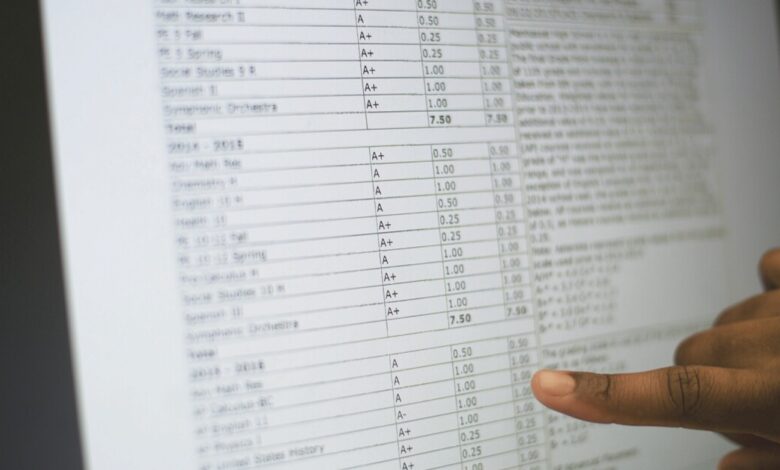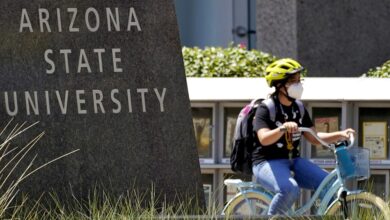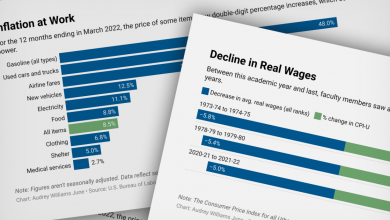Blanket Transcript-Withholding Policies Are ‘Abusive,’ Federal Agency Says

Blanket policies to withhold academic transcripts from students with outstanding loan debt to colleges are “abusive under the Consumer Financial Protection Act,” the Consumer Financial Protection Bureau found last week. Colleges should end the practice, the agency wrote in a news release on new guidance for federal investigators.
The bureau found that transcript holds because of a student’s overdue loan payments are a coercive practice with consequences that are “often disproportionate” to the student’s original debt. When students can’t get their transcripts, they are often unable to transfer to a different institution, get a job certification, or seek employment in a field that requires academic transcripts.
Until recently, transcript holds were a nearly universal practice in higher education. Ninety-five percent of colleges use them, according to a recent study by the American Association of Collegiate Registrars and Admissions Officers. Now, some colleges are taking steps to limit or eliminate their use, especially as a growing number of states seek to outlaw the practice. The U.S. Department of Education has largely declined to address the topic, a response some advocates described as “lukewarm.”
Terri Taylor, strategy director for innovation and discovery at the Lumina Foundation, has been studying the effects of transcript holds on equity and student success. She said that many institutions have viewed holds as a simple warning, whereas some students see them as insurmountable obstacles.
“This issue, for many institutions, is seen not as a student-success issue, but as a line on a balance sheet that their boards ask them about,” Taylor said. “You want students to be current on their balances … But you don’t want to lose them over something that could be addressed.”
But according to Taylor, that’s what sometimes happens when students can’t repay their institutions and remove the holds. A 2020 study by Ithaka S+R, the research division of an education nonprofit group, estimated that 6.6 million people had “stranded credits” — academic credits they have earned but cannot use.
Such holds disproportionately affect students of color and those from low socioeconomic backgrounds, a 2021 study found. Sosanya M. Jones, one of the study’s authors and an associate professor of higher education, leadership, and policy studies at Howard University, said that because transcript holds impede economic mobility, they create a vicious cycle for low-income students.
Some of those students “who aren’t paying their debts are not going to start paying their debts because of a hold — they just don’t have the means,” Jones said.
‘A Self-Fulfilling Prophecy’
The bureau’s findings follow its announcement in January that it would investigate colleges that extend private loans to students. Private student loans have long been a concern of the bureau, which in 2013 conducted a survey of students struggling under private-loan debt and concluded that private loans often carry fewer consumer protections than federal loans do.
A senior researcher at Ithaka S+R, Sarah Pingel, said that stranded credits are basically “a self-fulfilling prophecy.” The limitations from not being able to get a transcript can make repaying debt even more difficult for many borrowers, she said.
The bureau’s findings were lauded by the Student Borrower Protection Center. Winston Berkman-Breen, its deputy director of advocacy and policy counsel, said access to previously withheld transcripts could be a boon for borrowers who were previously denied them.
“Hiding in plain sight for so long, it’s just considered business as usual until recently,” he said. “We can finally call it abusive, this Catch-22 where we withhold this document from you because you owe us money. But by withholding it, we are prohibiting you from finishing your education, getting that job, and earning the money that you need to come back and pay us for the debt.”
In its findings, the bureau cited some specific abusive practices. At one institution the bureau investigated, transcripts weren’t released until full balances were paid, even when students entered into new payment agreements.
“In some cases, the institution collected payments for transcripts but did not deliver those transcripts if the consumer was delinquent on a debt,” the bureau said.
Eight states have already outlawed transcript holds in certain scenarios. California has the strictest law, prohibiting both public and private colleges from withholding a transcript when a student has an unpaid balance. Some statutes in other states specify certain situations when transcripts can’t be denied, such as when the student is pursuing an employment opportunity. A few other states, including Tennessee, require state colleges to place transcript holds in some scenarios.
Some higher-ed systems have even jumped the gun, eliminating the practice before their state does. In January, after New York’s governor said she’d ban the practice statewide, the State University of New York system immediately stopped withholding transcripts from students with outstanding balances.
Pingel noted that the bureau’s findings do not extend to students who fail to pay their tuition balances or a minor fee like the cost of a lost library book.
An official at the bureau told The Chronicle that its findings are not meant to be all-encompassing; rather, they show the results of investigations into various institutions while maintaining confidentiality. The findings were part of a process for instructing examiners in how to investigate possible violations of consumer financial protections. By publishing the findings, bureau officials hope to help higher-education leaders examine their own policies and better comply with federal consumer-protection laws.
While the scope of the bureau’s findings is limited, Berkman-Breen said, their implications could extend beyond colleges that issue loans directly to students.
“The practice of withholding the transcripts or diplomas or other important educational documents are happening across the board whenever an institution is owed a debt,” he said.
‘More-Extreme Measures’
Several organizations spoke out against the bureau’s findings. Career Education Colleges and Universities, a national organization that primarily represents for-profit colleges, said the bureau had overstepped its authority and had not used proper rule-making procedures.
“Instead of engaging institutions, engaging lenders, engaging the public on this practice of transcript withholding, they pulled a new interpretation of law into a guide for their examiners, which is a really terrible way of making policy,” said Nicholas Kent, the group’s chief policy officer.
The Coalition of Higher Education Assistance Organizations also came out against the findings, saying they denied a key method of debt collection for a number of institutions. According to Lori Hartung, the coalition’s president, colleges have few other means to motivate students to pay once they graduate or leave the institution.
Hartung said the findings did not provide much clarity to colleges attempting to comply with federal consumer protections. The bureau did not define what a “blanket policy” of transcript withholding is, nor did it clarify if holds may be appropriate in some scenarios.
The bureau official, who spoke with The Chronicle on condition of anonymity, declined to provide clarification.
The bureau’s findings were specific to certain institutions, the official said, as investigations are done on a case-by-case basis.
Hartung also said that, without the transcript-hold option, some institutions may have to turn to more-aggressive collection measures faster. “They start reporting the delinquent account receivable to the credit bureau or send the outstanding accounts receivable to a third-party debt-collection agency,” Hartung said. “But usually those are more-extreme measures after a period of time where the school tries to facilitate payment in an easier method.”
But Pingel, the Ithaka S+R researcher, said there was little evidence that any of those methods, including transcript holds, are effective in recouping delinquent debt. Based on the limited data available, she said, sending a student debt to a collection agency ends up being “pennies on the dollar based off the actual face value of the debt.”
Jones, the Howard University researcher, is studying other ways to equitably solve the stranded-credits problem. She said that debt-relief programs that allow students to re-enroll while paying off their debt in manageable increments is a possible path forward.
Jones said she hopes the bureau’s findings “will actually helped shift the conversation.”
“It’s a win for a student and their rights and their ownership of the credits that they earned,” she said. “It also raises awareness about the devastating impacts stranded credit has on every facet of a student’s life.”
Source link






